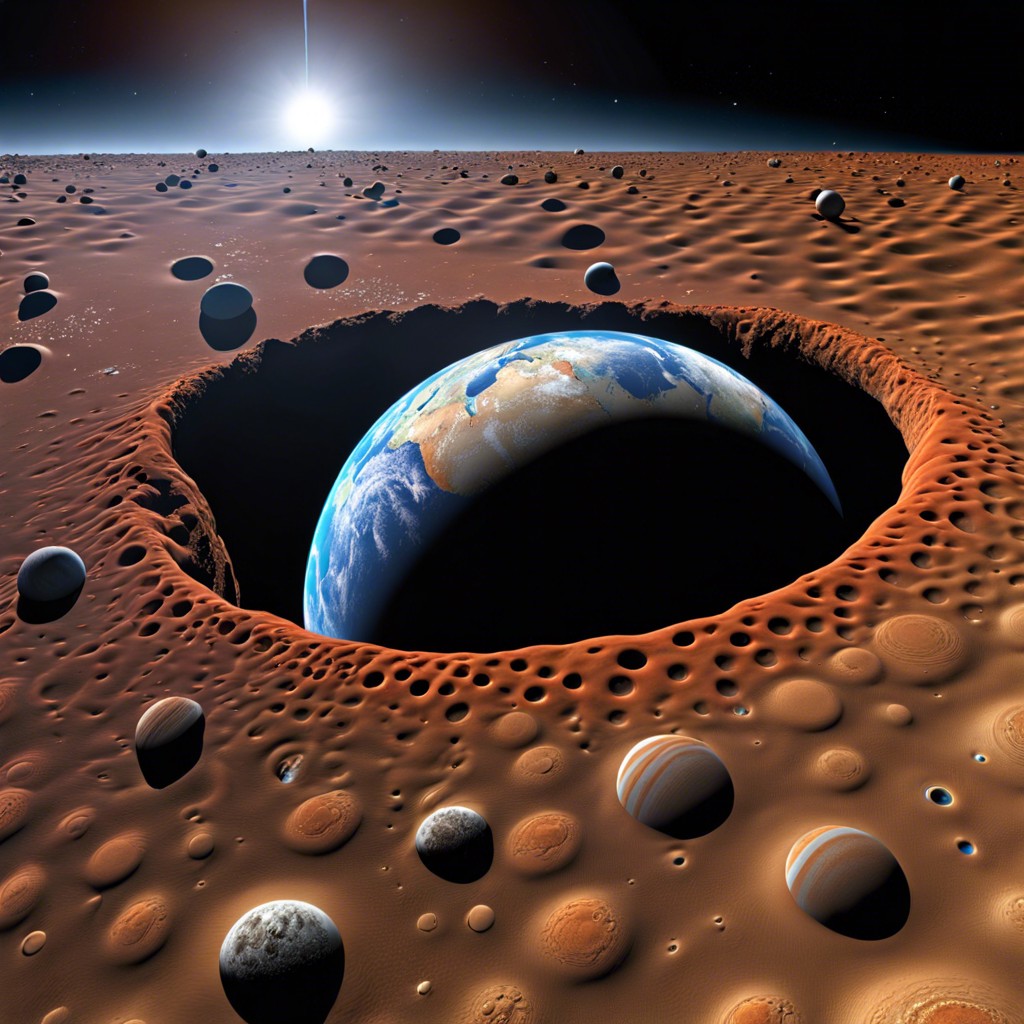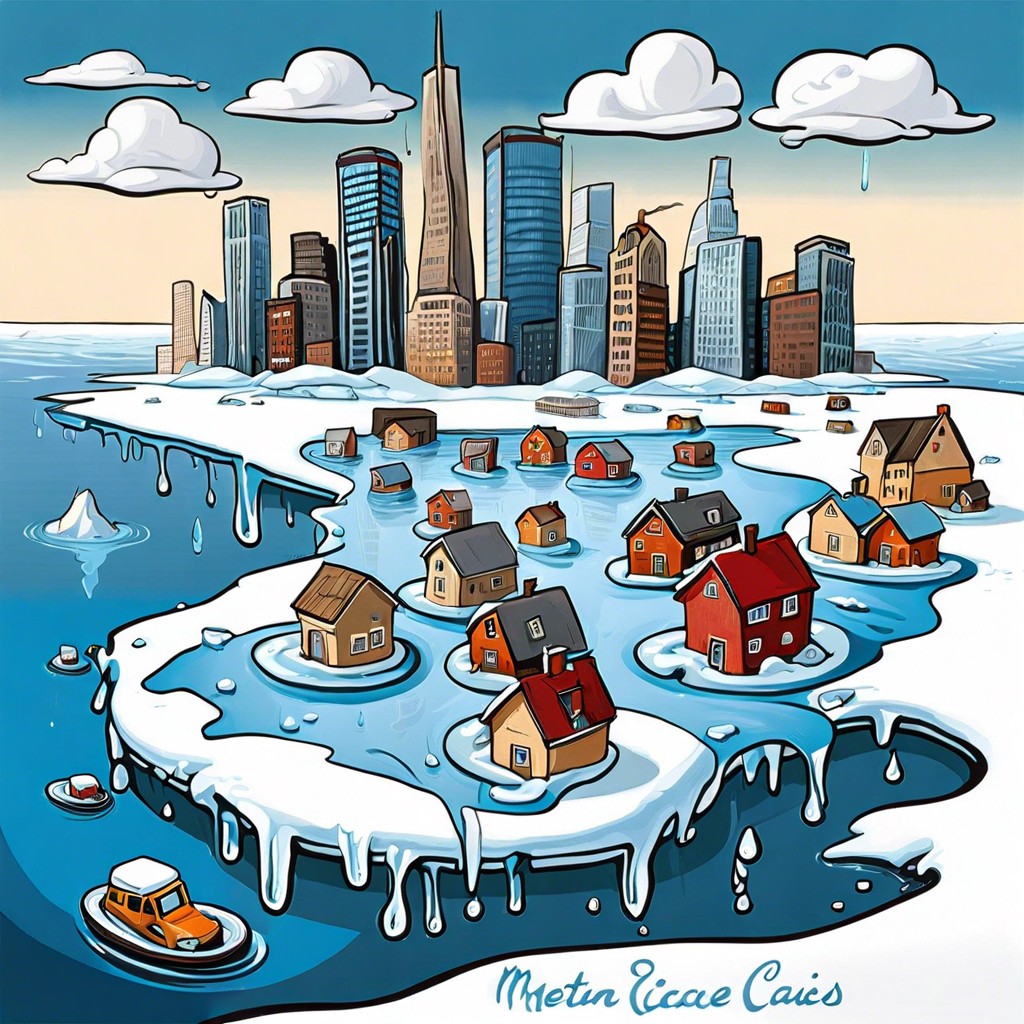Discover how Earth’s dynamics would radically change if Mercury swapped places with our Moon.
Ever wondered what would happen if our cozy moon swapped places with the blistering, celestial hot potato known as Mercury? Imagine gravity throwing a wild party, ocean currents deciding to dance to a different beat, and the night sky getting a dazzling makeover. From strange tides to eclipses on steroids, let’s take a trip through this cosmic shake-up and see just how our world would be turned upside down. Ready for a mind-bending lunar swap? Keep reading to unfurl the universe’s most outlandish “what if.”
Key takeaways:
- Earth’s dynamics disrupted by Mercury swapping with Moon.
- Mercury’s strong gravitational effects on Earth’s orbit and tides.
- Ocean currents altered, fishing grounds shift due to lunar swap.
- Night sky illuminated by Mercury, affecting stargazing visibility.
- Lunar phases and eclipses magnified by Mercury’s size and orbit.
Gravitational Effects On Earth

Imagine Mercury, the zippy little speedster of the solar system, suddenly deciding to hang around Earth! Its mass, nearly 20 times that of our current Moon, would certainly make its presence felt.
First off, Earth’s gravity would have some stiff competition. With Mercury pulling strongly, we’d feel the tug in several ways. Spinning objects would have curious paths, and our graceful satellites might wobble a bit in their orbits. You might even feel a tad heavier, or perhaps that’s just an excuse to avoid the gym!
Tidal effects would be on overdrive. Mercury’s powerful gravitational pull would make ocean tides more dramatic, causing massive high tides and low tides that could redefine coastal living. Surfing might become an extreme sport, not for the faint-hearted.
The Earth’s axis, which subtly wobbles due to the Moon’s gentle influence, would experience a much more pronounced shimmy. This could lead to unpredictable patterns in seasons and possibly even a whole new dance called “Earth’s Chaotic Shuffle.”
Suddenly, the relationship between our planet and its satellite would become a cosmic arm-wrestle, quite thrilling and not entirely stable.
Tidal Changes and Ocean Currents
Imagine the ocean waves getting a turbo boost. Complex as it might sound, if Mercury was our moon, the gravitational pull would be stronger. This force would give our tidal dances a compelling twist.
First, expect supercharged high tides. Surfing anyone? Forget Malibu, every beach could transform into a surfer’s paradise.
However, this gravitational strength means low tides would be super low, revealing sea floors like never before. Beachcombing might just get a whole lot more interesting.
Then comes the shift in ocean currents. This new moon could steer currents into unfamiliar routes. Who’s ready for some mystery in the maritime world? New ocean currents could mean new fishing grounds, altering marine ecosystems. Environmentalists and fishermen would experience a rollercoaster of change. And let’s talk about climate. Currents moving differently could affect weather patterns, possibly cooling or heating regions in unexpected ways.
So, three cheers to strong lunar pulls? Maybe. Or maybe just keep an eye on those rogue waves.
Impact On Night Sky Visibility
Mercury, with its reflective surface, would create a dazzling spectacle in our night sky. Forget those gentle moonlit strolls; imagine strolling under a glimmering disco ball. Nighttime illumination would increase significantly, akin to having a perpetually full moon.
Astronomers would either rejoice or curse. The enhanced brightness might wash out faint celestial objects, making stargazing more challenging. Goodbye, subtle beauty of the Milky Way; hello, unwelcome light pollution.
And let’s not forget the sheer size. Mercury is smaller than Earth’s current moon, but its varying distance due to its elliptical orbit would make for a dynamic visual treat. One night, a gigantic glowing ball, the next, a tiny speck. As thrilling as binge-watching a new series, but for the sky!
Altered Lunar Phases and Eclipses
Imagine the lunar phases, but on steroids—literally larger than life. With Mercury swinging around our planet, we’d see some pretty dramatic changes in how the moon looks from our backyard.
Firstly, Mercury is bigger and more reflective than our current moon. That means its phases would pack a brighter punch, lighting up our nights like never before. Goodbye romantic moonlit walks; hello sunglasses at night!
Then there’s the funhouse mirror game. Mercury’s faster orbit would speed up the cycle of lunar phases. We’d zip through new moon to full moon in record time, making our calendar look a bit like it’s had too much coffee.
Eclipses? Oh, those would be a spectacle! Mercury’s greater size would create colossal shadows. Imagine solar eclipses where the sun disappears for longer stretches. Talk about a showstopper!
Finally, consider the frequency. With a faster orbit, you’d get more frequent eclipses. More opportunities to throw eclipse parties—just stock up on those protective glasses!
Potential Changes in Earth’s Climate
When you swap out our moon for Mercury, you’re inviting a heavyweight guest to the cosmic party. With Mercury being about 5.5% of Earth’s mass (compared to the Moon’s measly 1.2%), this new companion’s gravitational pull would be a game-changer. How, you ask?
First up, Earth’s tilt could wobble more dramatically. Mercury’s stronger tug might yank Earth’s axial tilt back and forth, playing yo-yo with our seasons. You think winters are bad now? Buckle up.
Next, expect a more chaotic climate. The balance that the Moon provides is no joke. Mercury could disrupt atmospheric patterns, leading to extreme weather. Imagine hurricanes that appear like uninvited guests or unusual snowfall in tropics. Sounds fun, right?
Also, Mercury’s luminosity might affect solar radiation. Its closer proximity to the sun means it reflects more light. This could lead to small, yet impactful changes in Earth’s temperature. Not exactly your ideal summer glow up!
Our agriculture might not be smiling about this change, either. Crops sensitive to weather changes would face new challenges, making our grocery stores’ fresh produce section look a bit sparse.
So, swapping the Moon for Mercury isn’t just an invitation to a celestial soiree. It’s a full-on climate conundrum.




